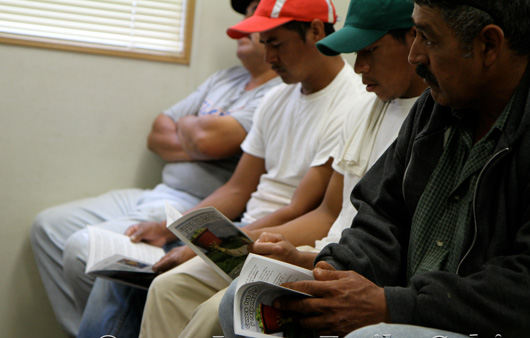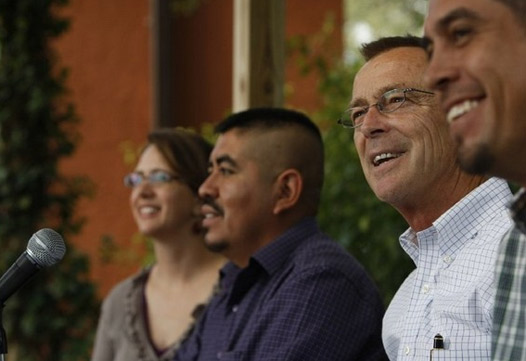
Workers learn about their rights under the Fair Food Program during a worker-to-worker education session on an Immokalee area farm. An article in The Atlantic by food writer Barry Estabrook, “Tomato School: Undoing the Evils of the Fields,” reports on a recent education session and the impact of the Fair Food Program on the Florida tomato industry, describing the industry’s trajectory from “one of the most repressive employers in the country… to being on the road to becoming the most progressive group in the fruit and vegetable industry.”
For many years, farmworkers from Immokalee traveled the country speaking with consumers in churches and synagogues, university classrooms and community centers, with one goal – to inform people about the brutal reality of exploitation behind the tomatoes in their tacos, burgers, and produce aisles. And for years, a battle raged between the CIW and the Florida tomato growers over that reality, with workers fighting to expose the truth and growers struggling to keep it under wraps.
While the fighting continued, the conditions only grew worse.
From Conflict to Collaboration in the Fields
But that all changed almost two years ago to the day, when, on November 16th, 2010, the CIW and the FTGE signed an historic agreement to work together to build the Fair Food Program, the CIW’s ambitious plan to harness the power of every major level of the supply chain – from consumers and retail buyers at the top to growers and farmworkers at the bottom – to construct a verifiable, enforceable, and sustainable system for social responsibility.
The shift from antagonism to partnership began when Jon Esformes, Operating Partner of Pacific Tomato Growers, said the following words as his company signed the CIW’s first Fair Food Agreement with a major Florida grower:
| “Pacific Tomato Growers (PTG) believes that it is time to speak out publicly about working conditions in agriculture. We along with many other responsible agricultural firms work daily to provide safe and fair working conditions, yet continued abuses within the industry demand that we speak out.” read more |
With those simple words, years of denial came to an end, setting the rest of the Florida tomato industry on an irreversible course toward change. A month later, Reggie Brown (below, second from right) of the Florida Tomato Growers Exchange signed a Fair Food Agreement on behalf of over 90% of the Florida tomato growers, saying:
|
“As we move forward, we can be certain that labor complaints will continue to arise in the foreseeable future, but it is how we deal with these complaints in this new partnership that will serve to demonstrate that we are serious and that our approach is working.” read more |
And with that, the transition from conflict to collaboration was complete.
Supermarkets turn their backs on progress
Since that time, the day-to-day, hard work of building the Fair Food Program has dominated the CIW’s efforts on the ground in Florida. With worker-to-worker education sessions in the fields almost daily, a 24-hour complaint line backed by a team of investigators and a tested system for complaint resolution, regular farm office and field audits to measure systems for compliance with the Fair Food Code of Conduct, and market consequences for growers who fail or refuse to comply with the Code, the Fair Food Program is quietly revolutionizing social responsibility in the US produce industry. In the words of a recent op/ed in the Washington Post (“Fair Food Program helps end the use of slavery in the tomato fields”):
|
“This Labor Day, like every other day, the world’s most exhausting, dangerous, poorly paid and degrading jobs are being performed by the world’s most impoverished and vulnerable people. But that is not true anymore in Immokalee. The Coalition of Immokalee Workers has changed Florida and U.S. agriculture for the better. May their brilliant model flourish and inspire producers, buyers, consumers and workers in every industry where labor slavery persists.” read more |
That same article called the Fair Food Program, “one of the great human rights success stories of our day.”
And that is the story — recognizing that the Fair Food Program is still a work in progress, with much yet to be done to weed out the bad actors and consolidate its gains — that farmworkers from Immokalee are telling today across the country.
Yet despite the historic advances under way in Florida’s fields — despite the vibrant and vocal support of consumers, and the participation of eleven major tomato buyers — supermarkets across the country still refuse to join the Fair Food Program. Instead of doing their part to support this remarkable new partnership, supermarkets are turning their backs. And they are turning their backs not only on the farmworkers who harvest their produce, but also on their customers – and even, in the case of companies like Publix, on their own public claims that “social responsibility is the life blood of our company.”
Giving thanks by taking action for Fair Food
That is why this Thanksgiving, the Fair Food nation is focusing on supermarkets across the United States. In a statement from Just Harvest USA:
| “With the Chipotle agreement just weeks ago on the eve of a National Day of Action and a base of  support that continues to grow and grow, the Fair Food Movement has a lot to be grateful for. support that continues to grow and grow, the Fair Food Movement has a lot to be grateful for.This year’s Thanksgiving Supermarket Week of Action comes at the start of the second season of full implementation of the Fair Food Program in the tomato fields of Florida. As we give thanks for monumental advances in Florida agriculture, we remember, too, the abuses and exploitation endured for generations by those harvest of our food. But with the new day dawning in the fields – and with thanks to be given to the 11 corporations that have signed agreements with the CIW – it’s important that we continue to push to bring the remaining hold-out corporations on board. By calling on supermarkets to commit to Fair Food, we can continue to work together to eliminate abuses and ensure dignity in the fields. Thanksgiving, one of the biggest times for supermarket business during the year, is the perfect time to join the national call and participate in the Thanksgiving Supermarket Week of Action, November 14-21, giving thanks to the Fair Food Program. We’ve already heard from allies across the country who are planning creative actions in front of their own local supermarkets. With creative actions such as staging mock Thanksgiving dinners outside of their local supermarkets – with an open invitation to the store manager – allies are taking the message of Fair Food to the streets!” |
Join the wave of actions building across the country as Fair Food allies plan protests and delegations to call on supermarkets to recognize and give thanks to the farmworkers who provide food for their shelves, and profits for their shareholders, by joining the Fair Food Program.
Write us at organize@sfalliance.org to plan your own action!


